The APH Annual Meeting 2025 will take place on November 25, with this year’s theme: ‘Sustainability in Public Health’. Focusing on people and planet, we aim to improve community health, reduce inequalities, and promote a healthier environment for all. Join us for an inspiring day to connect, share experiences, and explore new ways to advance sustainable public health, now and for the future.
We will kick off the day with an inspiring opening by ‘professional problem solver’ Babette Porcelijn, founder and director of the Think Big Act Now foundation. This will be followed by a duo-keynote presentation by dr. Niek Sperna Weiland and prof. dr. Wouter Hehenkamp, who will together navigate between hope and fear in climate change. The plenary morning session will be closed by keynote speaker, Lieke Boonen, deputy director of Pharos, who will share sustainable strategies to reduce inequalities. In the afternoon, you can join a variety of parallel sessions organized by our research programs. We will close the day with an inspiring and artistic act. Check out the full program and speakers below, or sign up immediately!
Plenary morning session
(9:30-12:20 hrs)
Opening: Babette Porcelijn
Think big, act now
Babette Porcelijn will open the event with an inspiring keynote. Discover the hidden blind spots in your thinking about sustainability and gain fresh insights into how your actions impact both people and the planet. Babette will equip you with practical action perspectives to apply immediately. By the end of her presentation, you’ll know exactly what is important to watch out for and how you can get started, starting with the actions that have the biggest impact.
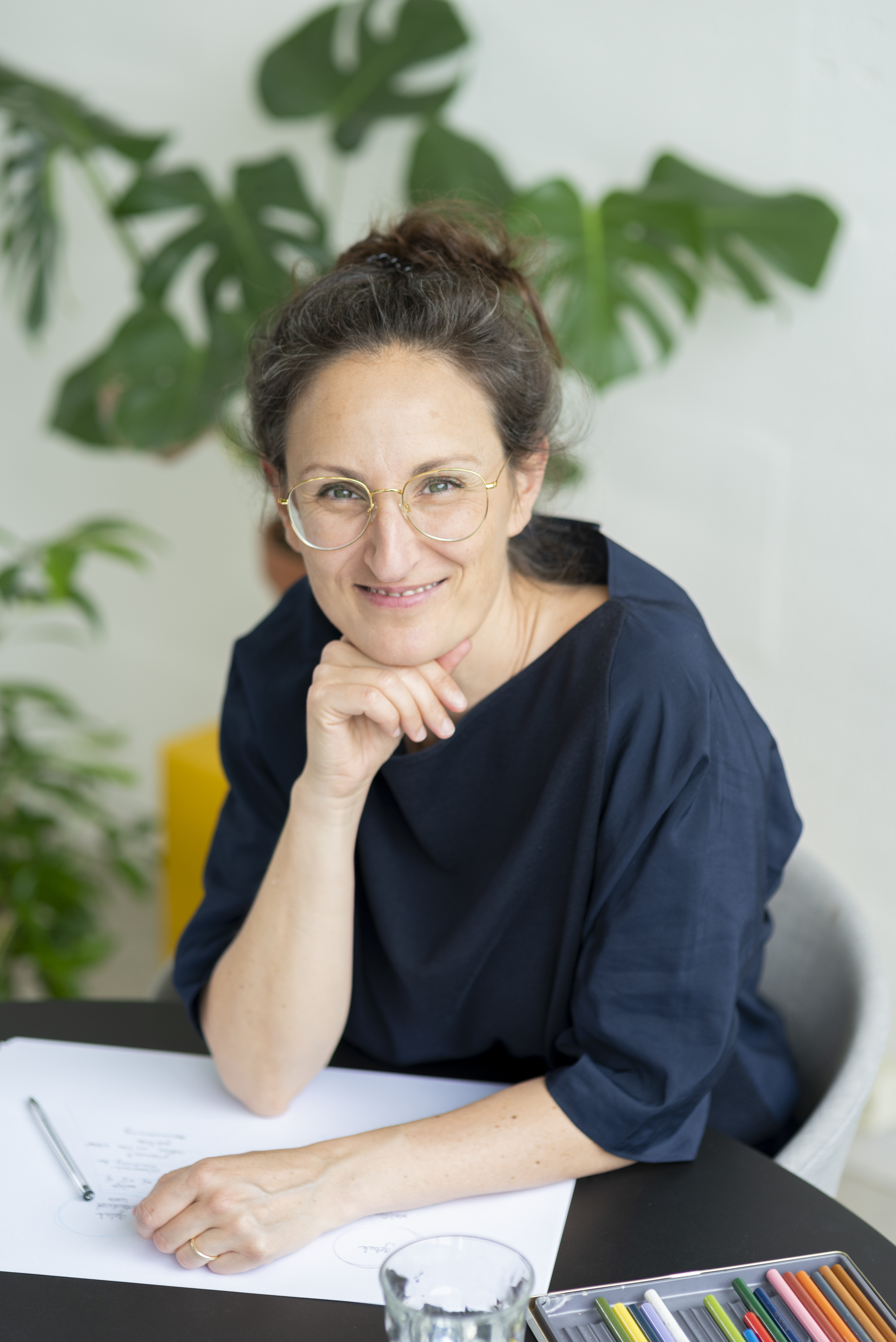 ir. Babette Porcelijn
ir. Babette Porcelijn
Keynote 1: Niek Sperna Weiland & Wouter Hehenkamp
Climate change: navigating between hope and fear
Climate change has two faces. On the one hand, there is the undeniable threat posed by a rapidly changing world—rising temperatures, extreme weather events, and growing pressure on ecosystems and human health. On the other hand, we are witnessing a systemic transition of unprecedented scale. For the first time in history, societies across the globe are rethinking energy, food systems, mobility, and healthcare in a way that opens up new opportunities for innovation and collaboration. This creates a tension between negativity and positivity. Without realism, there can be no genuine sense of urgency; yet without hope and optimism, there is no energy to drive the transition forward and to turn challenges into solutions. In a duo presentation, prof. dr. Wouter Hehenkamp and dr. Niek Sperna Weiland will share these two sides of the coin with the audience. Using clear examples and concrete actions, they will provide practical tools to help everyone contribute to addressing the greatest health crisis of our time: the climate crisis. Special attention will also be given to the newly released position paper “Sustainability in Research”, which offers guidance on how to make your own research practices more sustainable, or even integrate sustainability itself as a tangible outcome of your scientific work.
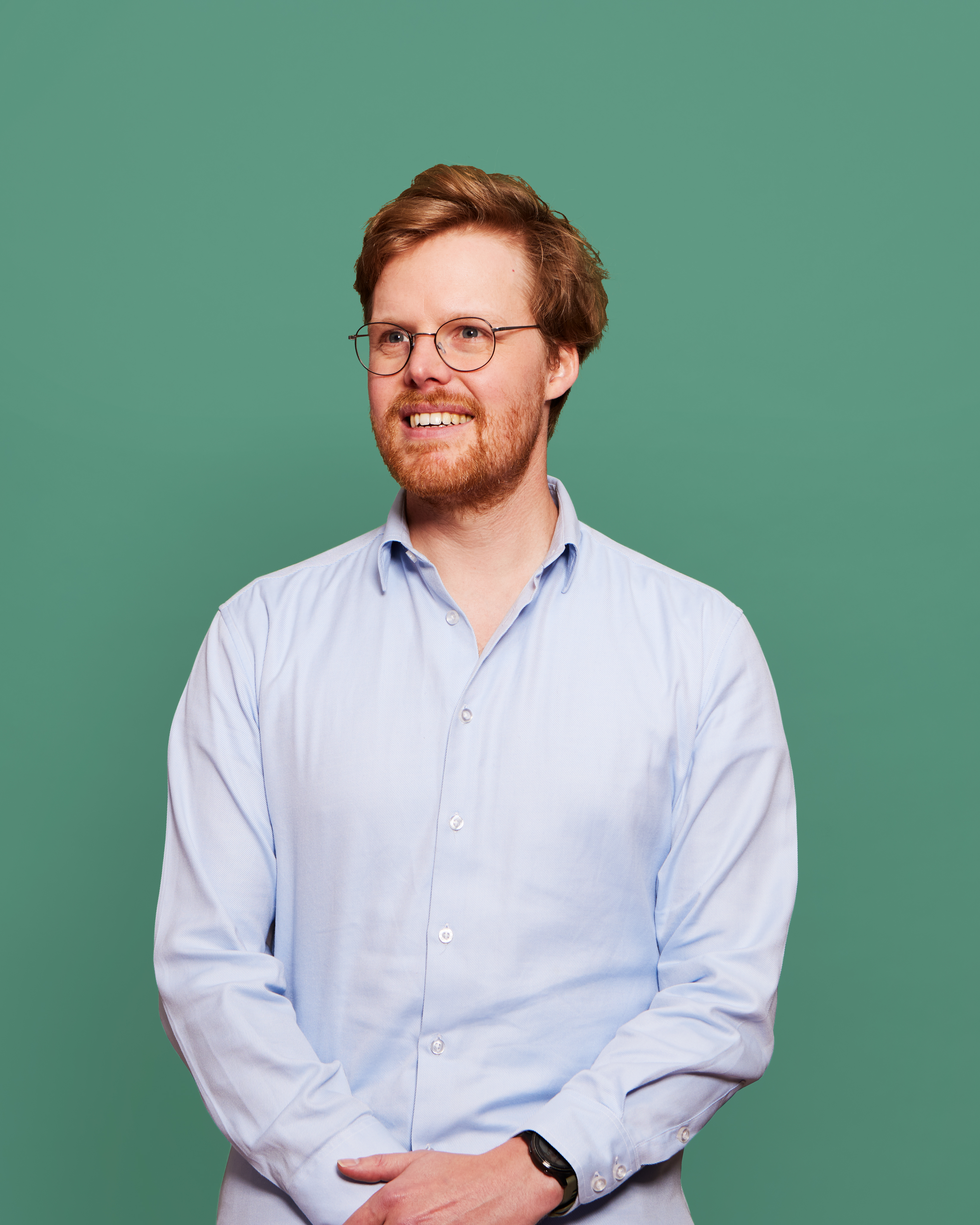 dr. Niek Sperna Weiland
dr. Niek Sperna Weiland
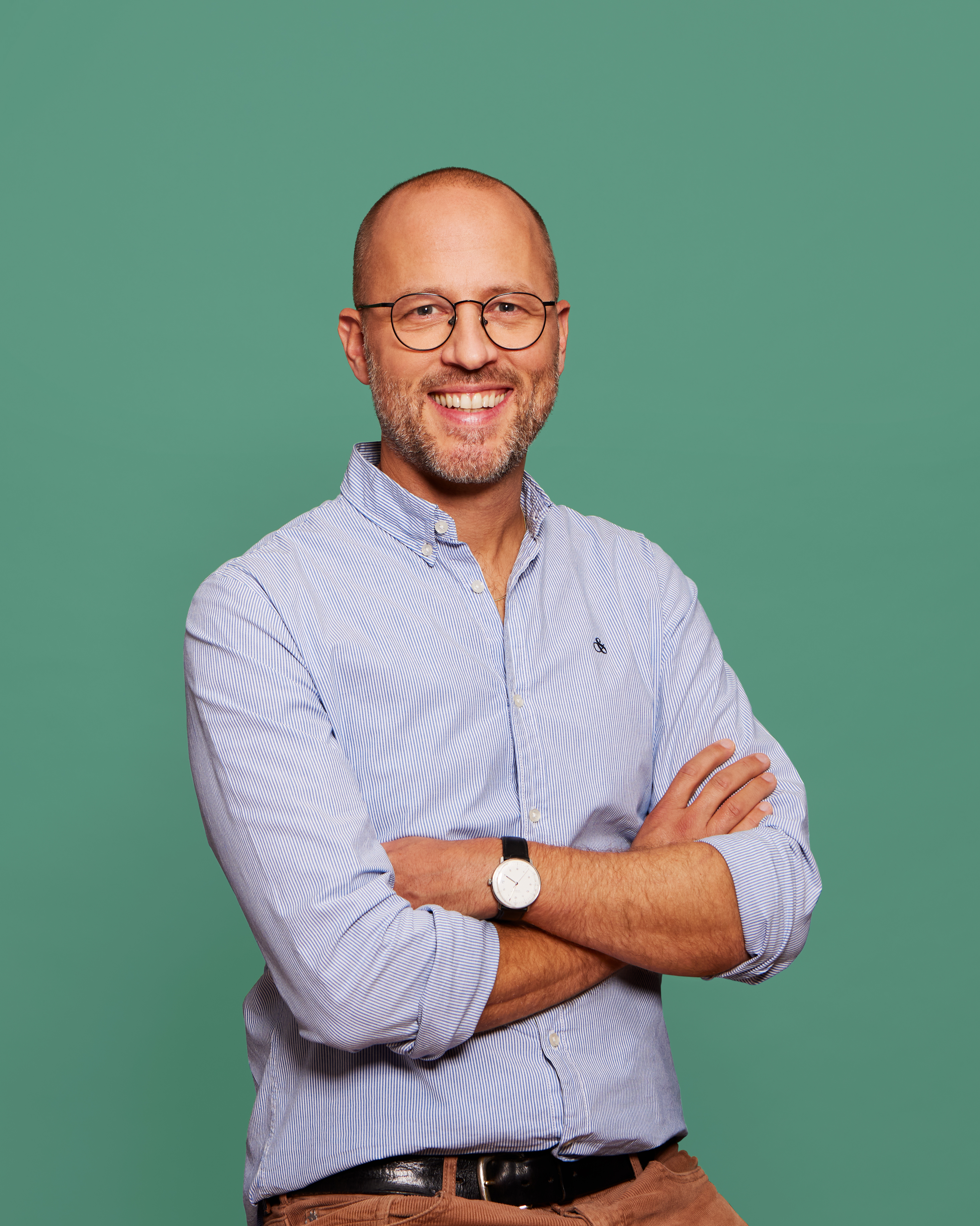 prof. dr. Wouter Hehenkamp
prof. dr. Wouter Hehenkamp
Bio: dr. Niek Sperna Weiland is a staff anesthesiologist, particularly focused on reducing the environmental impact of anesthetic practices, leading efforts to phase out the use of volatile (gaseous) anesthetics both in the Netherlands and internationally. His research interests lies at the intersection of healthcare and environmental sustainability. Beyond clinical practice, he founded and currently directs the Amsterdam UMC Centre for Sustainable Healthcare. Here, he is dedicated to bridging research and implementation to drive sustainable change within healthcare. His work involves supporting over 65 Green Teams, fostering a vibrant community of more than 4,000 engaged employees, and guiding a diverse team that includes PhD students, post-docs, and experts in Life Cycle Assessment (LCA) and Health Technology Assessment (HTA). Additionally, He represents the Faculty of Medicine in ‘UvA Seven’, the University of Amsterdam’s climate initiative, where he works on applying systems transformation to promote climate action and resilience. His research is deeply collaborative, and he actively partners with companies, governments, NGOs, and healthcare professionals in multidisciplinary initiatives aimed at achieving sustainability transitions in healthcare.
Bio: prof. dr. Wouter Hehenkamp has been a gynecologist since 2011 and has been working ever since in Amsterdam UMC. In addition to his clinical and research expertise, Wouter has developed a keen interest in sustainability in healthcare, recognizing the inextricable link between sustainable practices and effective medical care. This focus led to his appointment as a professor of ‘appropriate and sustainable healthcare’ in 2024. Five of his PhD students are focusing completely on sustainability and are appointed through grants in sustainability research. Together with Prof.dr. Dionne Kringos (deputy head of dept public & occupational health) and Dr. Niek Sperna Weiland (see above) he works on incorporating sustainability in research within Amsterdam UMC. They have written a position paper ‘Sustainability in research in Amsterdam UMC’. It will be published in the fall of 2025.
Keynote 2: Lieke Boonen
From inequality to equity: Sustainable strategies to reduce inequalities
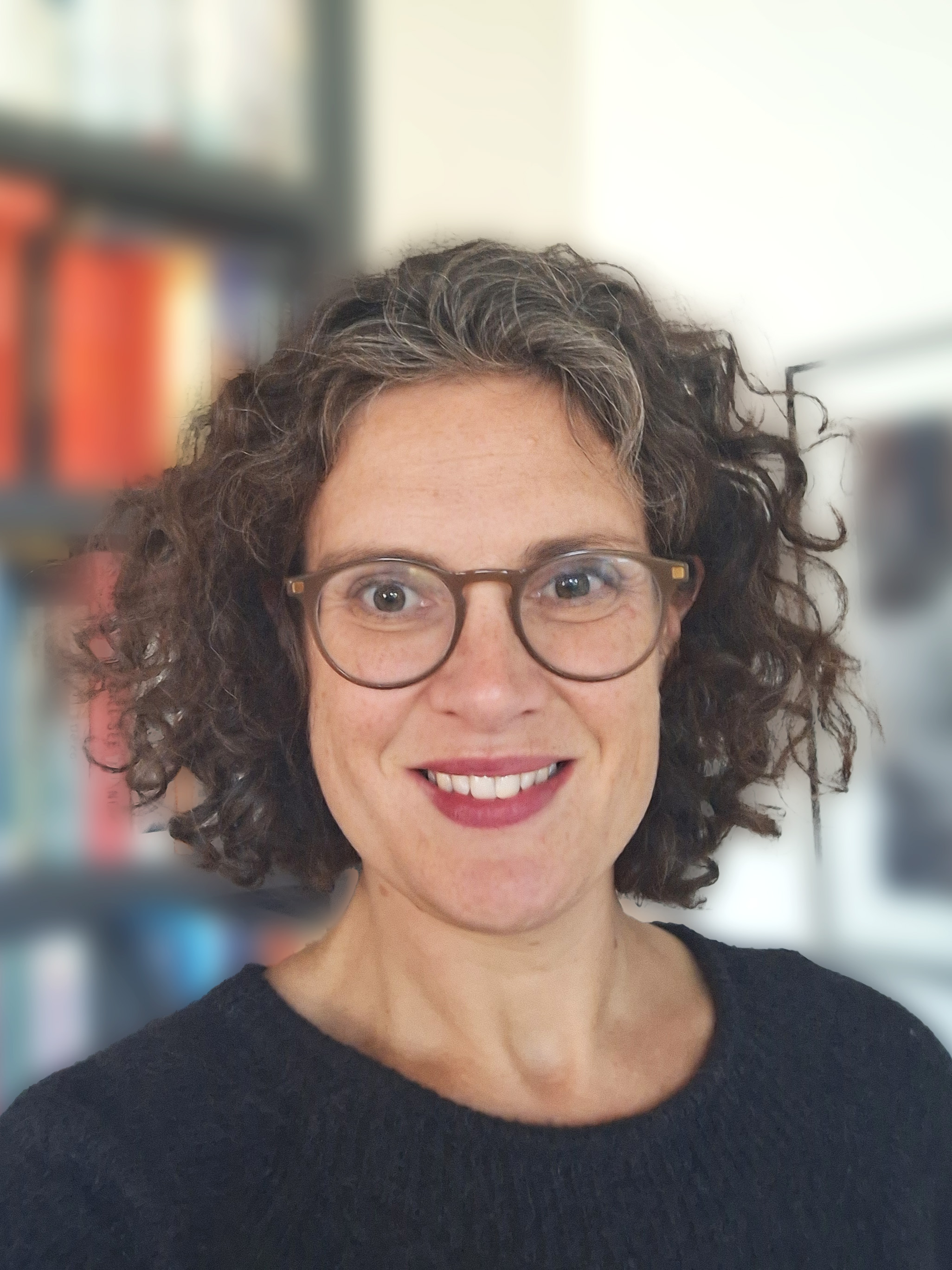 dr. Lieke Boonen, deputy director Pharos
dr. Lieke Boonen, deputy director Pharos
Bio: dr. Lieke Boonen is deputy director of Pharos, the Dutch centre of expertise on health inequalities. Pharos works to reduce health disparities by providing knowledge, advice, and practical tools for professionals, policymakers, and communities. Lieke is also affiliated with Erasmus School of Health Policy & Management (ESHPM). Her work focuses on improving access to health care and reducing health inequalities by bridging research, policy, and practice.
Lunch activities
(12:30-13:50 hrs)
During the walking lunch break you can network with fellow APH researchers, visit the poster presentations or attend this year's creative lunch activity: Arts in Science.
Arts in Science
(12:50-13:50 hrs)
Join us for an inspiring and creative lunch activity where art and science come together. This interactive session is designed around three main elements:
- What about Arts in Science? Discover the world of Arts in Science, a unique type of research, at our information stands. Hosted by Anja Lok, psychiatrist at Amsterdam UMC.
- Get inspired by art: Experience and join the ‘MeeMaak Atelier’, an art experience by artist Nieke Koek where participants translate their pain or bodily sensations into abstract, three-dimensional clay objects. Only a few spots available. Hosted by Menno Dudok an Heel, head of art affairs and conservator at Amsterdam UMC.
- Make art together: Unleash your creativity! Contribute to large collaborative artworks with paint on themes such as sustainability and public health.
Come learn, experience, and create: discover how art can enrich science and vice versa!
APH Poster presentations
(12:50-13:50 hrs)
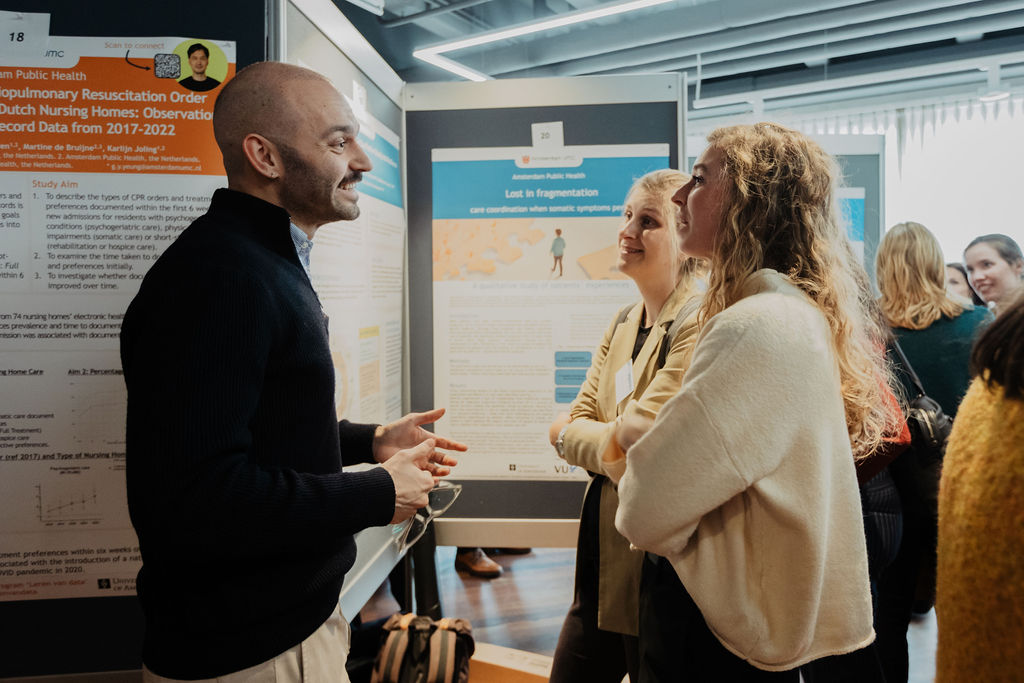
Submission procedure
Submit an abstract before Monday October 13 (12:00 hrs) via the form below. Fill in this form and send it to aph@amsterdamumc.nl. All submitted abstracts will be reviewed by the program leaders on scientific and methodological quality, scientific and societal relevance, innovative character and suitability to APH (both overall and to your research program), and on data available to be presented.
Ultimately October 30 you will be informed whether your abstract is accepted and you can present a poster during the poster sessions. The best posters compete for the APH Poster Award 2025! The award comes with a money prize in vouchers:
- Winner: € 500
- Second place: € 300
- Third place: € 200
APH Sustainability Booster Grant
APH is offering 6 APH Sustainability Booster Grants with a value of maximum € 5.000 to APH researchers. The booster aims to strengthen sustainable research practices within APH. To compete for this booster grant, you have to submit an eligible booster plan and attend the APH Annual Meeting on November 25. At the end of the Annual Meeting, 6 winners will be selected during the plenary closing ceremony based on random selection. More about the APH Sustainability Booster Grant 2025 can be found on this page.
Parallel theme sessions
(14:00-15:30 hrs)
After lunch and the poster presentations, parallel theme sessions will be held hosted by the APH research programs.
(1) Climate change, green environment, and health
Organized by Global Health & Mental Health
The maximum of participants has been reached. Session is fully booked.
Climate change affects our environment in numerous ways, through rising temperatures, extreme weather, and environmental degradation. Its impact on human health is profound, worsening air and water quality, spreading infectious diseases, and increasing disaster-related trauma. Exposure to climate disasters or displacement can trigger stress, anxiety, depression, and PTSD. Long-term changes such as droughts or rising seas may lead to chronic grief and loss, especially in land-connected communities. Even those not directly affected can experience climate anxiety, particularly younger generations concerned about the planet’s future. Mental health is a vital part of climate resilience. Green environments offer protective benefits, reducing stress, improving mood, fostering recovery and strengthening community cohesion. This session will explore global research on how climate change affects mental health and infectious diseases, highlighting strategies to build resilience through environmental and public health interventions. Presenters in this session are: dr. Jurjen Luykx, Philip Elders and dr. Jolanda Maas.
(2) Contemporary public health challenges from a complexity perspective
Organized by Health Behaviors & Chronic Diseases
The maximum of participants has been reached. Session is fully booked.
The grand public health challenges of this century are likely to share systemic drivers. A complexity perspective can help expose how the dimensions health outcomes, social inequalities, planetary health and economic prosperity are emergent properties of the underlying system(s) as a whole. In this workshop, we will use a complexity perspective to view these dimensions together, rather than in silos. Workshop participants will: i) identify the major driving forces affecting health outcomes, socioeconomic inequalities, economic prosperity and planetary health, for unhealthy diets, physical inactivity and smoking; ii) identify the interconnectedness of these drivers; iii) discuss potential research agenda’s to tackle the interconnected systemic drivers around diet, physical activity and smoking. After this workshop, participants will understand the interconnectedness between the four dimensions and be inspired to apply these insights to their own future research.
(3) Digital sustainability: the hidden impact of data and methods
Organized by Digital Health & Methodology
As digitalization and AI grow in public health, so does their environmental footprint. This session, co-organized by APH Digital Health and APH Methodology, explores how our data practices and methods contribute to carbon emissions—and how we can act more responsibly. Our colleagues from Amsterdam UMC bring diverse perspectives to this challenge. Charlotte Lafage, software engineer, lecturer in Medical Informatics, and member of a Green Team, uses visual comparisons to raise awareness of the CO₂ impact of digital tools. Arnaud Lauteslager, head of Architecture, Security & Policy, shares how sustainability is being embedded into the hospital’s IT infrastructure and AI governance. Oscar van der Meer, AI architect with a background in law, life sciences, and computer science, presents practical strategies to optimize research pipelines and reduce digital waste. Together, they highlight the emerging field of Green AI and invite you to reflect on and improve the sustainability of your digital work.
(4) College Tour: Aging in place through the eyes of older people with life experience (in Dutch)
Organized by Aging & Later Life
We organize an exchange between researchers and older persons around the topic ‘aging in place’. We invited a panel of older people with diverse life experiences. This also includes the local chair for older persons who provide advice to policymakers. We aim to apply the College Tour format, allowing interaction with the audience. The panel will share their thoughts on several presented dilemmas and in between there is room for the audience to ask questions. We also form a panel of researchers on the topic of aging in place and supportive technologies. Questions we would like to address include: what dilemmas do you experience to continue living in your home as you age? What facilitates you to age in place and what is missing? Is there a type of technology that would be helpful for you to age in place? Our session fits in the overall theme of the annual meeting, as aging in place is a form of sustainable living.
Note: The session will be held in Dutch to make it easier for the panel to express themselves.
(5) Sustainability as method: Embedding environmental awareness, reflexivity, and equity in research practices
Organized by Quality of Care
This interactive session will explore how reflexivity, care, and environmental awareness can reshape research practices. We will discuss the importance of perspective-taking, community engagement, and equity in the green transition, emphasizing how researchers can integrate inclusive and just approaches through study design, methodology, and ethical reflection. We will start by exploring why caring for the environment is an essential part of being a responsible researcher today, highlighting the growing urgency to consider the environmental impacts of our work and the broader role that research plays in shaping a sustainable future. Drawing on key quotes from expert interviews, we will introduce a competence framework for sustainability in research and innovation, highlighting core competencies in care, reflexivity, and environmental responsibility. Participants will then be invited to engage with our participatory micromodules – specifically 'Nature Relations in Research and Innovation' and 'Technology, Research and Sustainability'. The session will conclude with sharing experiences of the exercises and how the content might influences the participants research activities, and we will signpost where and how participants might deepen their engagement with sustainability as method.
(6) Coloring connections. Researching gender, intersectionality, and health in the climate crisis
Organized by Personalized Medicine
To develop equitable responses to the pressing health issues of our time, including the climate and ecological crisis, researchers and health professionals must explore what gender-sensitive and equitable health research looks like. This creative session invites participants to draw, color, and engage in discussions on integrating gender dimensions—alongside other aspects of diversity (intersectionality)—into health research at all levels within the context of the climate crisis. Topics of interest include heat stress, violence, health systems, medical education, and urban planning. Through coloring and drawing exercises, we will clarify concepts and methodologies, exploring questions such as: What factors contribute to heat stress and how to integrate land surface temperature in research? What is the positionality of the researcher? How are gender and health in the climate crisis, and Planetary Health, related to my own research and practice? Artworks will be exhibited for participants of the conference. This session will be hosted by dr. Petra Verdonk from Dutch Society for Gender & Health (NVG&G).
Note: This session is limited to 30 participants.
(7) What about our own (mental) health and wellbeing? (How) Do we practice what we preach?
Organized by Societal Participation & Health
The maximum of participants has been reached. Session is fully booked.
A research job can be demanding—especially in today’s (academic) climate. In this interactive workshop, we will explore the (mental) wellbeing of (young) researchers. What can we learn from each other? What do we need from one another and from our department? Where can we be more critical? Together, we’ll create an open space for reflection, sharing, and inspiration. Let’s make a difference - together. This workshop is organized in co-creation with the APH Diversity, Equity & Inclusion (DEI) committee.
Plenary closing
(15:50-16:30 hrs)
Sustainability Booster Grant award & Poster award ceremony
The plenary closing session will begin with the APH Booster Grant 2025 award ceremony, where proposals from APH researchers aimed at furthering APH’s sustainability goals will be selected by lottery. This will be followed by the announcement of the winners of the APH Poster Award 2025.
Creative closing
The session will conclude with an inspiring and artistic closing performance. Afterwards, we invite you to stay for drinks and appetizers until around 18:00 hrs.
It promises to be an informative and enjoyable day, highlighting a growing field of research with plenty of opportunities to connect with your fellow APH researchers!
Registration has closed. Please contact aph@amsterdamumc.nl

